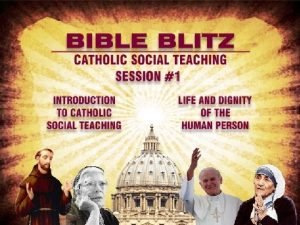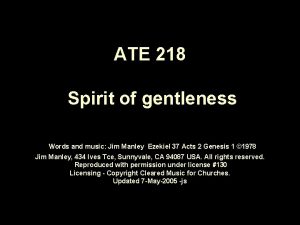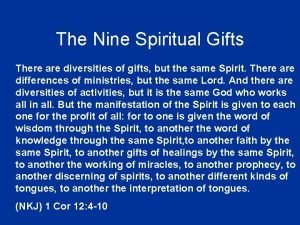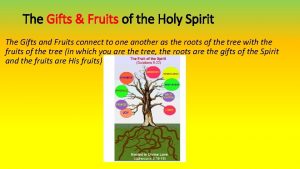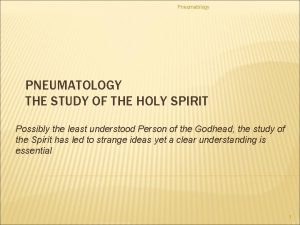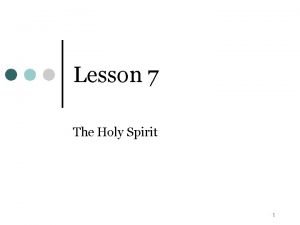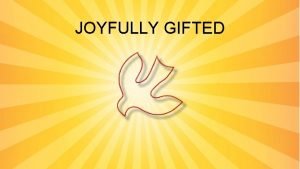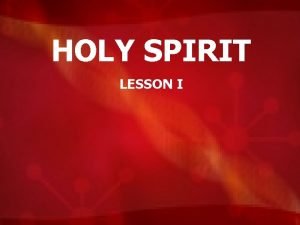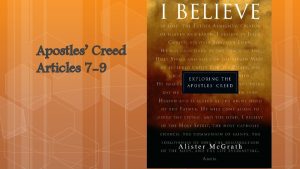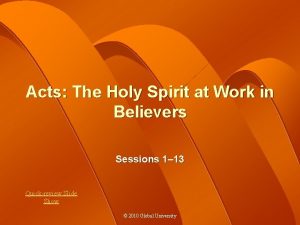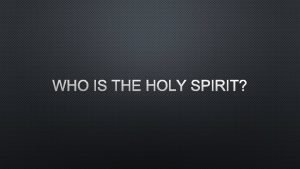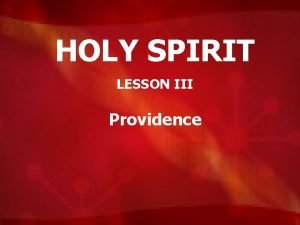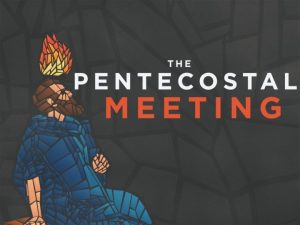Hymn 143 Let the Holy Spirit Guide Verses






















- Slides: 22

Hymn #143: “Let the Holy Spirit Guide, ” Verses 1 and 2 1. Let the Holy Spirit guide; Let him teach us what is true. He will testify of Christ, Light our minds with heaven's view. 2. Let the Holy Spirit guard; Let his whisper govern choice. He will lead us safely home If we listen to his voice.

Making a Purchase 1. I read a written review on the Internet by someone who already owns the item I am interested in buying. 2. I read a written review in a well-respected national magazine that performs their own product testing. 3. I spoke to an informed friend or neighbor. Questions: • What is the value of each source of information? • What type of information is provided? • Why is the source important when making a decision?

Henry B. Eyring “ … What you have learned to date won’t be sufficient for the future. Your hope and mine is that you have learned how to learn. That gift will turn out to be priceless. . . you only really learn a principle by using it over and over again. ” (Emphasis added. ) (“Learning How to Learn, ” BYU-Idaho Commencement Address, 2004)

Gathering Scholarly Information 1. Author’s Credibility: Why does it matter what credentials the author has? 2. Target Audience: Why would scholar to scholar be a valuable audience for research? 3. Age of Publication: What are some topics that the age of the publication may not matter; what are some where it is essential to be up to date? 4. Cited References: Does the source include cited references?

Example #1 Find Out Anything From Anyone, Anytime From the back of the book: Description: “The secret to finding out anything you want to know is amazingly simple: Ask good questions. Most people trip through life asking bad questions—of teachers, friends, coworkers, clients, prospects, experts, and suspects. Even people trained in questioning, such as journalists and lawyers, commonly ask questions that get partial or misleading answers. People in any profession will immediately benefit by developing the skill and art of good questioning. ” Publication Date: January 20, 2014 About the Authors: “James Pyle is a human intelligence training instructor who has served the U. S. Army … and the Joint Intelligence of the Pentagon. ” “Maryann Karinch is the author or coauthor of 19 books. ”

Example #2 How To Use Computers Description: “There's so much to learn about computers that knowing where to start can be daunting. How to Use Computers filters out the hype and confusion and focuses on what you need to know to become proficient —setting up your computer so it meets your needs, running basic applications, getting started on the Internet, and more. ” (Amazon) Publication Date: 3 rd edition (August 1997) About the Author: “Lisa Biow is a computer trainer and consultant to small- and medium-sized businesses in Oakland, California. She has taught everything from introductory computer classes to advanced database management courses on the college level. Lisa has authored several books on PC software, as well as the First and Bestseller's Edition of How to Use Your Computer. ” (Inform. IT)

Example #3 History of Rome Description: “The book portrays not only the cynosures of the Roman world, but also lesser known figures, reassessing their impact upon both the character of Roman society and the development of the Empire. Rome's artistic achievements, especially in literature, architecture, sculpture and painting, are scrutinized, and the economic and social conditions of life for ordinary people are examined. Finally, the changing relationships between Rome and the peoples of its provinces, and the reasons for the ultimate disintegration, or transformation, of the western empire are closely examined. ” (Amazon) About the Author: “Michael Grant (1914– 2004) was a historian whose over forty publications on ancient Rome and Greece popularized the classical and early Christian world. He studied at Trinity College, Cambridge, served in intelligence and as a diplomat during the Second World Publication Date: (1978) War, and afterwards became deputy director of the British Council's European division, when he also published his first book. He later returned to academia, teaching at Cambridge and Edinburgh, and serving as Vice Chancellor at the University of Khartoum and at Queen's University, Belfast. ” (Faber & Faber)

Example #4 Tuesdays With Morrie Description: “Maybe it was a grandparent, or a teacher, or a colleague. Someone older, patient and wise, who understood you when you were young and searching, helped you see the world as a more profound place, gave you sound advice to help you make your way through it. For Mitch Albom, that person was Morrie Schwartz, his college professor from nearly twenty years ago. Maybe, like Mitch, you lost track of this mentor as you made your way, and the insights faded, and the world seemed colder. Wouldn't you like to see that person again, ask the bigger questions that still haunt you, receive wisdom for your busy life today the way you once did when you were younger? Mitch Albom had that second chance. He rediscovered Morrie in the last months of the older man's life. Knowing he was dying, Morrie visited with Mitch in his study every Tuesday, just as they used to back in college. Their rekindled relationship turned into one final ‘class’: lessons in how to live. ” (Amazon) Publication Date: 10 th Anniversary About the Author: “Mitchell David Albom is an author, journalist, screenwriter, playwright, radio and television broadcaster Rep edition and musician. His books have collectively sold over 35 million copies worldwide; have been published in (June 29, 2007) forty-one territories and in forty-two languages around the world; and have been made into Emmy Award-winning and critically-acclaimed television movies. ” (Goodreads)

Using Tutor Services “In revelation the Lord has mandated that this people get all the education they can. He has been very clear about this. ” (“Rise Up, O Men of God, ” Gordon B. Hinckley, 2006) Question: What are some qualities you look for in a tutor?

Becoming a Tutor “ … That which one willingly shares he keeps, while that which he selfishly keeps he loses. ” (“Preach My Gospel, ” President Thomas S. Monson, p. 198)

Guessing the Meaning From Context 1. When reading, what do you do when you come to a word that you don’t know? 2. Do you find that you can figure out the meaning of the reading without looking up the word? (Show your answer by using your fingers. ) 1. All of the time 2. Most of the time 3. Some of the time 4. Never 3. What do you feel are the best ways of dealing with unknown words?

Making an Educated Guess You know much more than you think you know; the term for this is "passive knowledge. ” Passive knowledge means that you understand the ideas you are reading from personal experience, but you may not know all of the words in English. If you guess the word’s meaning, chances are you will get it right most of the time. If you work with others, with your combined passive knowledge, you will get most of the answers right. This is important for you because your confidence in your own abilities will increase. This is important in learning to speak a foreign language.

Vocabulary in Context #1 The lion’s roar could be heard in villages far away. 1. 2. 3. 4. food a lion eats dream ear the sound a lion makes

Answer roar #4: the sound a lion makes

Vocabulary in Context #2 José has so many friends because he is a gregarious person. 1. 2. 3. 4. shy quiet outgoing rude

Answer gregarious #3: outgoing

Vocabulary in Context #3 My absent-minded boss loses his keys, his pens, and his pencils almost every day! 1. 2. 3. 4. hateful intelligent doesn’t pay attention trustworthy

Answer absent-minded #3: doesn’t pay attention

Vocabulary in Context #4 The thought of eating a snake is abhorrent to most people. 1. 2. 3. 4. fun horrible delicious sweet

Answer abhorrent #2: horrible

Vocabulary in Context #5 Table salt is finer than rock salt. 1. 2. 3. 4. better quality made of smaller particles cleaner more smelly

Answer finer #2: made of smaller particles
 Let the holy spirit guide you
Let the holy spirit guide you Precious spirit come holy spirit come lyrics
Precious spirit come holy spirit come lyrics Holy spirit meaning
Holy spirit meaning Glory glory oh god almighty
Glory glory oh god almighty Holy holy are you lord
Holy holy are you lord Let me let me let me
Let me let me let me O sacrament most holy hymn
O sacrament most holy hymn Hymn 482
Hymn 482 Spirit spirit of gentleness
Spirit spirit of gentleness Vocal gifts of the holy spirit
Vocal gifts of the holy spirit What are sins against the holy spirit
What are sins against the holy spirit Charity fruit of the holy spirit
Charity fruit of the holy spirit Communion with the holy spirit
Communion with the holy spirit There's a sweet, sweet spirit in this place
There's a sweet, sweet spirit in this place Study of the holy spirit pneumatology
Study of the holy spirit pneumatology Coming down of the holy spirit
Coming down of the holy spirit Names of the holy spirit
Names of the holy spirit Facts about holy spirit
Facts about holy spirit Holy spirit prayer
Holy spirit prayer Qualities of the holy spirit
Qualities of the holy spirit What are the 12 fruits of the spirit
What are the 12 fruits of the spirit The seventh article of the creed speaks of the holy spirit
The seventh article of the creed speaks of the holy spirit Acts the holy spirit at work in believers
Acts the holy spirit at work in believers







